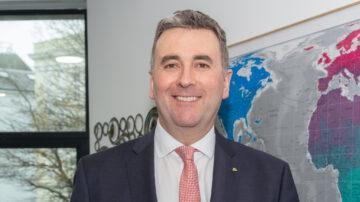Funnelling capital into nature-positive projects that work with, not against, nature was one of the strong themes that emerged on the first conference day of Sustainable Finance Week.
The conference began with a keynote from financier and environmentalist Ben Goldsmith (pictured), who asserted that rewilding – restoring land to its natural, uncultivated state – should become an asset class, adding that there is a strong economic case to be made for doing so.
He said: “Solutions that run with the grain of nature are often cheaper, more durable, they work.”
Ben, who has spent three years rewilding an area in Somerset along with neighbouring landowners, said many people had lost touch with nature and added: “If we restore the functionality of nature, it will be our main ally in fixing this carbon problem.”
He said this requires both an economic and emotional shift towards nature.
The first panel discussion of the day, Insurance and the Opportunities of Net Zero, saw Natalia Dorfman, CEO and founder of Kita Earth Limited, Glenn Ellis of AIRMIC and Stuart Logue of Flood Re discussing challenges and opportunities facing the industry.
Natalia said: “The insurance industry has huge potential with climate change both to provide resilience when things go wrong, as well as using insurance as an innovative way to understand new industries that can be insured.”
On the approach to flood mitigation in the UK, Stuart said one of the healthiest ways of addressing flooding issues is managing water within the natural environment, as well as investment at a domestic level.
The panel also discussed how to overcome challenges such as the use of emerging technologies, for example satellite data and artificial intelligence, to assist insurers and enhance their ability to assess and manage climate related risk.
Natalia said: “The challenge I have seen is taking new data and incorporating it into existing structures.When you get fancy data from AI and it needs to meld into existing excel sheets, it’s a challenge. Figuring out how to make it work, legacy data systems with new data, they just don’t merge immediately.”
Finally, on captives and carbon offsets, Glenn said: “Captives could potentially be one of the risk financing vehicles for the efficacy of carbon offsets.”
The second panel session saw Harriet Assem, BVCA, Amy Lazenby of Close Brothers Asset Management, John Pepin of Philanthropy Impact and Tonia Plakhotniuk of NatWest debate private funds and the opportunities of net zero. The panel outlined the myriad of new standards and disclosures in sustainable finance, and asked if this plethora of standards are driving investors towards net zero.
“TCFD [Task Force on Climate-related Financial Disclosures] is becoming an important standard for climate-related financial disclosures and has become voluntarily adopted by an increasing number of corporate firms and investors,” said Harriet.
“We’re all looking at how we can embed the key elements of these standards”, she added.
On how the regulations are being perceived, Tonia said: “Increasingly we are seeing investors perceiving the objectives of the regulations as a key opportunity and something that drives the market.”
She added that disclosures are appreciated by investors: “Ultimately investors are looking for transparent disclosures because they struggle with the data themselves.”
On the role of financial advisers, John said Philanthropy Impact’s recent study on Gen Z and Millennial wealth holders found that those wealth holders increasingly want to use their wealth for positive environmental and social impact.
He added that the wealth management industry is falling short of helping those wealth holders achieve what they want.
The day concluded with a dignitary address by Alison Gavey of the Guernsey Financial Services Commission, who announced the launch of a discussion paper on ISSB.
On the implementation of regulations and standards, Alison said: “At the Commission we take a very practical approach. We filter out the developments most relevant to Guernsey and consider whether and how to apply those most sensibly.
“Guernsey is assessing if and how to best use the standards to ensure that business are prepared, able to continue competing internationally, and how to best make use of the information gained.”














